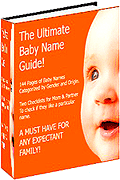Popular Baby Names - Names and their Meanings
Page 2
Often over-stimulated babies calm themselves by looking away, yawning or sucking on their lips – this self-relaxation increases their parasympathetic activity and reduces sympathetic nervous activity.
In plain English the parasympathetic nervous system chills us out and the sympathetic nervous system stresses us out.
The two systems work side by side to create a flow in the system. However, for example, through lack of sleep, this balance gets thrown out and your baby is more stressed out then muscles tense up and blood vessels are constricted.
In this culture, with all its inherent pressures, people's Sympathetic systems very often stay on guard, unable to give in to the softer, more gentle flows of the Parasympathetic system.
If we’re used to being tense we might not even think it a problem if our baby is also tense – and, as with adults, a chronic state of tension leads to stress related symptoms and illness.
What can help?
Learning to relax for a start. There are many forms of relaxation. Yoga, meditation, tai chi, pilates – these are just a few choices. There may be classes nearby or you could watch a video at home to learn the right moves.
Start early
During pregnancy, especially the final trimester, there can be anxiety about the impending birth. Regular listening to relaxing music to help create a relaxed state during pregnancy can actually help during the birth itself. By the time your baby is born, your body will have learned to relax even more deeply to the music, as a conditioned response.
Mothers-to-be are encouraged to play music to their unborn babies because research has shown babies can respond and be soothed by soft music both before and after birth. According to Dr. Thomas Verny, author or 'The Secret Life of the Unborn Child' your baby can kick in time to music from 25 weeks. The right musical stimulation can enhance development, encourage sucking and promote weight gain in newborn babies as well as help them to be relaxed and calm.
A relaxing day
Imagine the difference you could make to your life by getting into the habit of relaxing through activities like yoga, meditation or listening to calming music every day – especially if you set a regular time. It’s worth it.
If you and your baby are more relaxed then sleep is going to be a lot easier. If your baby is spending his or her time in a relaxed and calm state during the later part of the day or around the time you would like him or her to start dropping off, it can only help.
We’re the same – if we’ve just been dancing away at a party we’re hardly likely to be in the mood to sleep straight afterwards – we’d be buzzing - so why should babies be any different?
About The Author
Daphne Nancholas is a registered homeopath and for the past 10 years has specialised in the female cycle, including pregnancy, birth and babies. Her book, Taking Off, a handbook for newly qualified homeopathic practitioners was published in 2003. Her website is: www.daphnehomeopath.co.uk. Daphne and her partner Graham Smith have written a relaxation CD especially for mother and baby - the website is: www.calmtime.co.uk. Calmtime helps during pregnancy, birth, breastfeeding and anytime your baby is restless, irritable and/or has sleep problems. Helps all the family relax.
|
Helpful Tips For Overcoming Sleep Problems For Your Baby And You
Back to Page 1
